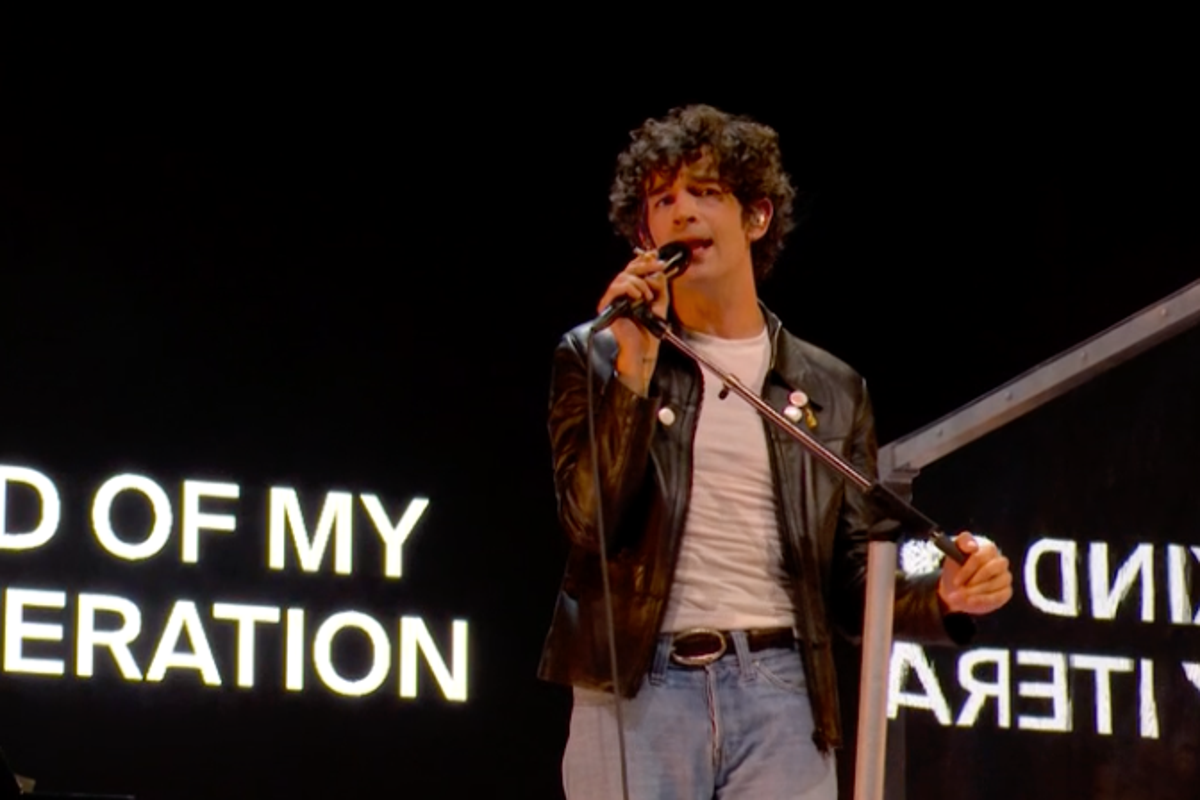“I want to be sincere with everyone,” The 1975 frontman Matty Healy says, visibly choked up during the band’s Glastonbury Friday night headline set. “I’m probably the best songwriter of my generation…” If you’re unfamiliar, it might sound arrogant. If you’re a fan, you know he’s joking, sort of. There’s sincerity, facetiousness, and knowing self-parody layered in. As Healy’s mock-grandiose speech ends, the band launches into their breakout 2013 hit “Chocolate” – a funk-pop anthem about weed and small-town boredom, its phonetic lyrics flashing on screen for the crowd. A decade later, the once-ironic statement about being a generational songwriter has aged with a surprising amount of truth, and that’s part of the gag.
Using the language of Glastonbury, 2024 has been a fallow year for the band, having wrapped up a lengthy world tour for their last album Being Funny in a Foreign Language – a chaotic, self-aware performance art piece where Healy smoked, drank, ate raw meat, and did topless press-ups. It was an exaggerated, performative reaction to his pandemic-era deep dive into online subcultures and algorithm-driven exposure to manosphere-type content.
But online, context collapses and meaning gets lost unless you’re familiar with the lore. In the TikTok era, where arena shows are tightly choreographed, fans often know what to expect before a performance begins. The 1975 flipped that: their tour became a two-way meta-commentary with fans. Healy would tweak or abandon certain bits as the show evolved alongside internet culture, making each performance an unpredictable, living entity.
So what is the context here for their Friday main stage headlining set? As a pop band who wrap themselves in layers of cultural criticism, who were rumoured on Reddit to have spent four times their fee on this bespoke set, it was safe to assume they aimed to create a living, breathing cultural moment in exchange for the landmark moment. Where other headliners have recreated their latest tour performance (in the vein of 2022 headliner Billie Eilish) or go on stage and simply deliver the hits (typical of Glastonbury favourites Coldplay and of legacy acts like The Who), that isn’t how The 1975 approach their work, so neither are the expectations of them the same.
The challenge of having to follow such a discourse-ridden and celebrated world tour seems to be weigh heavy on them; a certain tentativeness alludes to the fact that they are all-too aware of the cultural significance of this moment. The first half of the set is technically pristine. Sax-heavy tropical house meets Eighties pop on tracks such as “Somebody Else”. Healy’s soulful but crisp vocals are impeccable and each member is given space to showcase their talent. When the lyrics to the whimsical, orchestral “Part of the Band” flash across the screen, it’s a striking reminder of how literary and ambitious Healy is as a songwriter. The song, a surreal meditation on self-awareness and culture, feels especially significant here.
But there are evidently nerves bubbling under the surface that, in certain moments, spill over. At one point, Healy’s hands visibly shake holding a cigarette. It’s a relief when his anxiousness seems to slip away the minute he takes his leather jacket off and perches on a stool with an acoustic guitar. The clarity and simplicity of the band’s best ballad, “Be My Mistake”, a stripped-back, tender address to someone the narrator cheated on their partner with, seems to settle that edgy energy.
The band return to top form via an outfit change and one of their biggest anthems, “It’s Not Living”, an upbeat love song about heroin. With the impressive multicolour square display, their performance pops into HD, his audience kicks into gear and Healy is finally grinning in response. On the stage his band first performed on over a decade ago, he jumps and laughs in disbelief at the size of the crowd looking back at him.
This is a band at the height of their powers, as evidenced by a moving rendition of their most political hit, 2018’s “Love It If We Made It”, made even more pertinent by the apparently ever-worsening state of the world. It perfectly chimes with the band in all their contradictions, not least after Healy announces, unprompted: “We don’t want our legacy to be one of politics. We want it to be one of love and friendship.” For a band so tied to political and cultural commentary – through interviews, lyrics, controversies – this statement feels like a pivot.
But really, it’s a clarification. Politics has always been just one layer of The 1975. Their identity is more pertinently one of a total confidence and the unique ability to create an inner-circle intimacy. Undoubtedly, nerves or not, they’ve established themselves as the first future legacy headlining band of their generation.

